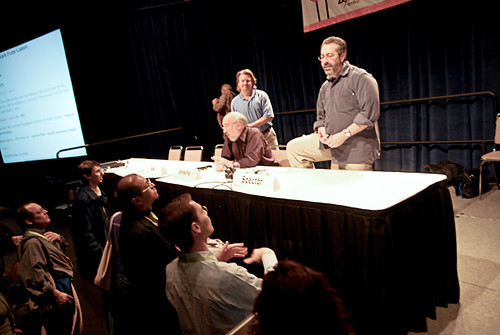Speakers:
- Henry Jenkins – Co-Dir CMS, MIT
- James Gee – Mary Lou Fulton Presidential Professor of Literacy Studies, Arizona State University
- Warren Spector – GM Creative Dir, Junction Point – Disney Interactive Studios
People are turned off by learning in the education system, but games are using learning as a ‘gateway drug’.
Games don’t just exist in the game, they survive online in the social networks. Support and advice on how to get through a game can be found eg in a forum.
Schools reward autonomous learners – collaboration is seen as cheating.
Trend now is to see the player as a designer – ie Spore
Critical media literacy is important.
When using games for education the authority/basis of the simulator/game is not questioned – just as textbooks don’t tend to be questioned. Need to look at mechanics of a game, critique it and so be able to design one yourself.
Games have taught that failure isn’t bad and collaboration is good. Opposite of schools.
Sci-fi is more interested in world-building than character-building. Reading for a world invites more creativity than reading for narrative. Readers can fill in the gaps in that world – flesh out the stories/narratives for themselves.
Photo by austinistdotcom.
